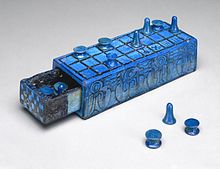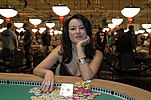Our website is made possible by displaying online advertisements to our visitors.
Please consider supporting us by disabling your ad blocker.
Portal:Games
The Games Portal

A game is a structured type of play, usually undertaken for entertainment or fun, and sometimes used as an educational tool. Many games are also considered to be work (such as professional players of spectator sports or games) or art (such as jigsaw puzzles or games involving an artistic layout such as mahjong, solitaire, or some video games).
Games have a wide range of occasions, reflecting both the generality of its concept and the variety of its play. Games are sometimes played purely for enjoyment, sometimes for achievement or reward as well. They can be played alone, in teams, or online; by amateurs or by professionals. The players may have an audience of non-players, such as when people are entertained by watching a chess championship. On the other hand, players in a game may constitute their own audience as they take their turn to play. Often, part of the entertainment for children playing a game is deciding who is part of their audience and who participates as a player. A toy and a game are not the same. Toys generally allow for unrestricted play, whereas games present rules for the player to follow.
Key components of games are goals, rules, challenge, and interaction. Games generally involve mental or physical stimulation, and often both. Many games help develop practical skills, serve as a form of exercise, or otherwise perform an educational, simulational, or psychological role. (Full article...)
Selected article -
The board game Monopoly has its origin in the early 20th century. The earliest known version, known as The Landlord's Game, was designed by Elizabeth Magie and first patented in 1904, but existed as early as 1902. Magie, a follower of Henry George, originally intended The Landlord's Game to illustrate the economic consequences of Ricardo's Law of economic rent and the Georgist concepts of economic privilege and land value taxation. A series of board games was developed from 1906 through the 1930s that involved the buying and selling of land and the development of that land. By 1933, a board game already existed much like the modern version of Monopoly that has been sold by Parker Brothers and related companies through the rest of the 20th century, and into the 21st. Several people, mostly in the midwestern United States and near the East Coast of the United States, contributed to its design and evolution.
By the 1970s, the false idea that the game had been created by Charles Darrow had become widely believed; it was printed in the game's instructions for many years, in a 1974 book devoted to Monopoly, and was cited in a general book about toys as recently as 2007. Even a guide to family games published for Reader's Digest in 2003 gave credit only to Darrow and none to Elizabeth Magie or any other contributors, erroneously stating that Magie's original game was created in the 19th century and not acknowledging any of the game's development between Magie's creation of the game and the eventual publication by Parker Brothers. (Full article...)
Did you know? -
- ...that the 2005 World Series of Poker Ladies Champion (pictured) had been nominated for an Academy Award in 1994?
- ...that Bruce Webster was so burned out from writing the computer game SunDog: Frozen Legacy for the Apple II, that he gave up programming for four years?
- ...that the chess Grandmaster Wolfgang Uhlmann is one of the world's leading experts on the French Defence?
- ...that Dungeons & Dragons, an album by Midnight Syndicate, is the only official soundtrack to the Dungeons & Dragons role-playing game?
- ...that the video game Scarygirl puts players in control of a young girl with an eye patch, a sewn-shut mouth, and a hook-capped tentacle for one arm?
General images
Subcategories
Related portals
WikiProjects
Things to do
Selected picture

A pinball machine with clear siding to reveal the internal components
Associated Wikimedia
The following Wikimedia Foundation sister projects provide more on this subject:
-
Commons
Free media repository -
Wikibooks
Free textbooks and manuals -
Wikidata
Free knowledge base -
Wikinews
Free-content news -
Wikiquote
Collection of quotations -
Wikisource
Free-content library -
Wikiversity
Free learning tools -
Wiktionary
Dictionary and thesaurus
Previous Page Next Page





















































